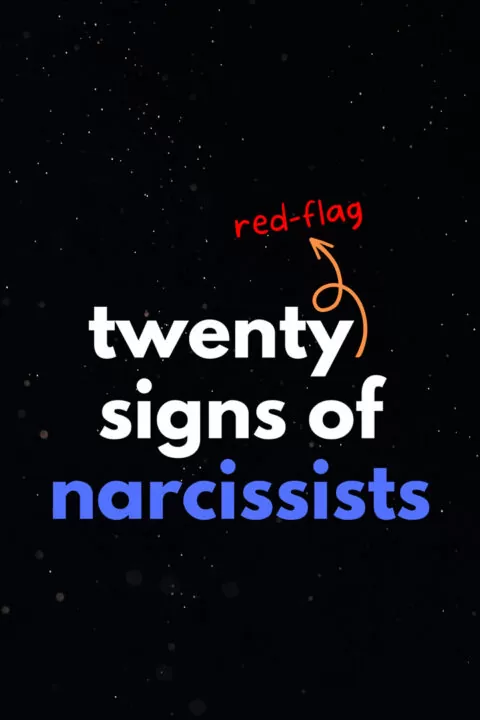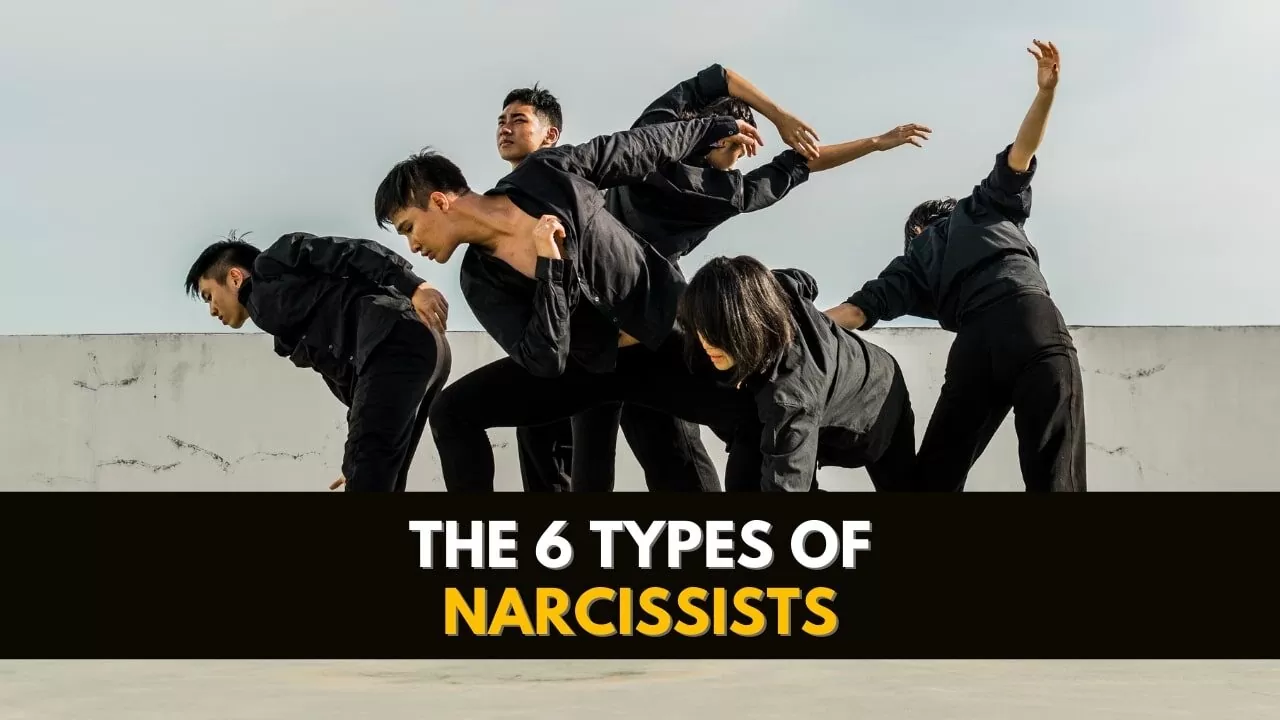Today's Monday • 13 mins read
— By Dr. Sandip Roy.
- A narcissist realizes that they are the most important person in a room.
- The grandiose narcissist makes sure everyone else in the room knows it.
Grandiose narcissists are a special kind of narcissist. They waste no time asserting their authority, putting you down, and explaining why they are better than everyone around.
It’s immediately apparent that these folks will, by default, seek to be the center of attention for feeling good about themselves.
Narcissism in an exaggerated amount is unhealthy and may have links to other mental health issues, and this is especially true with grandiose narcissism.
How To Spot A Grandiose Narcissist?
People with grandiose narcissism have a grandiose sense of self-worth. This means they are overconfident of their abilities, feel highly self-important, feimpulsive, distrust experts, and shift blame for poor decisions. Narcissistic grandiosity is often linked with competitiveness and overestimating one’s attractiveness.
- Narcissistic grandiosity is a personality trait characterized by an inflated sense of self-importance and a belief in one’s own superiority.
- The Narcissistic Grandiosity Scale (NGS) is a 16-item self-report scale that asks participants to rate how well they agree with statements like “I am a natural leader” and “I deserve to be treated better than most people.” The NGS has been shown to be a valid and reliable measure of narcissistic grandiosity (The Narcissistic Grandiosity Scale, Rosenthal & Hooley, 2019).
They believe they are superior to others in intelligence, talent, and appearance. They may also have a strong need for admiration and attention, and they may become easily angered or defensive when they do not receive the attention they believe they deserve.
We know very little about a narcissist’s everyday behavior, and a grandiose narcissist is difficult to spot. They might seem like any other extroverted person passionately telling stories in a group.
But there are several science-backed telltale signs when they’re in the midst of a narcissistic episode.
A large body of research indicates grandiose narcissists are characterized by high self-esteem, a sense of personal superiority and entitlement, overconfidence, a willingness to exploit others for self-gain, and hostility and aggression when challenged (Miller et al., 2017).
[Why Are Narcissists Insecure: 10 Reasons Unveiling Their Fragility]
The grandiose narcissists are in love with a grandiose image of themselves. They believe they are entitled to everything and deserve a better life than everyone else. They are obsessed with prestige and power and frequently treat others as their servants.
Here are some signs of a grandiose narcissist:
1. Grandiose Narcissists Routinely Declare Their Grandiosity
Narcissists, by definition and nature, have an unrealistically inflated sense of self-worth and self-importance. They genuinely believe they are unique and entitled to special treatment.
Grandiose narcissists take it a step further. In any social situation, they routinely declare how superior they are to others, how unique their talents are, and how they are above ordinary recognitions.

In psychology, grandiosity refers to a mental health condition that makes people overestimate their abilities or characteristics.
Men tend to show higher levels of grandiose narcissism than women (Grijalva et al., 2015). This means that narcissistic men often feel a sense of entitlement and are willing to take advantage of others.
They also show more assertive and dominating behaviors (Grijalva et al., 2015). In fact, studies have found that men display higher levels of narcissistic admiration and rivalry than women (Leckelt et al., 2017).
Grandiose narcissists are more likely to manipulate others through lying, cheating, and stealing (for example, recounting other people’s achievements as their own), as O’Reilly & Doerr showed in 2020.
They frequently throw around the names of powerful and rich people to impress others. They emphasize how much more they contribute to society than anyone else.
However, their achievements and influence are often exaggerated and falsified versions of the real happenings.
Surprisingly, despite their belief in their superior intelligence and leadership qualities, research shows they often do no better, and in some cases perform worse, than non-narcissists (Guedes, 2017).
2. Grandiose Narcissists Are More Impulsive In Their Actions
Narcissists are more impulsive than non-narcissists. Vazire and Funder (2006) believe “impulsivity is one of the defining characteristics of narcissism.”
Narcissists strongly like to approach their goals. This often involves being insensitive to the negative repercussions of making choices, as Littrell et al. in 2020, and Malesza & Kaczmarek, in 2018, found.
Research suggests that aggressive sexual behavior is more common in men who exhibit antagonistic features of grandiose narcissism, such as entitlement and exploitativeness (Zeigler-Hill et al., 2013).
When making decisions, the impulsive nature of narcissists may cut short their search for information and potentially result in worse decision quality.
The impulsiveness of narcissists can also be manifested in their promiscuous sexual strategies (Reise & Wright, 1996). For example, narcissism correlates with an ex-partner’s reports of relationship infidelity.
3. Grandiose Narcissists Ignore Experts & Attack When Questioned
Grandiose narcissists don’t like advice. Several studies show narcissists have low trust in experts.
In three studies, Kausel and his team of researchers showed that narcissism was negatively linked to advice-taking (Kausel, 2015). Kausel suggested that because narcissists judge their skills and intellect as superior to others, and are less concerned about people’s feelings, they wilfully ignore advice from experts.
When facing challenges, narcissists are more likely to respond with hostility, as Boeckler et al. discovered in 2017.
In 2015, Blinkhorn found that grandiose narcissists frequently respond with animosity when questioned because they feel they are not being recognized as superior.
Narcissists avoid taking responsibility for failures and find people to lay the blame on. However, their decisions are always made boldly, even when poor in quality. Many political and organizational leaders have this streak.
When challenged or confronted with failure, narcissists tend to shift the blame onto others.
As Selle et al. discovered in 2019, narcissists are more likely than non-narcissists to claim credit for successful outcomes but blame failures on other people.
4. Grandiose Narcissists Seek & Often Reach Top Leadership Positions
The world sees this as a positive side of narcissism. Narcissists are more likely to work hard obsessively to reach the uppermost ranks. They often make great organizational leaders.
Steve Jobs and Larry Ellison are two of the best examples of narcissistic leadership, both known for being emotionally isolated and highly distrustful.
According to research, grandiose narcissists frequently seek out and acquire positions of leadership in companies. Nevertheless, their tendency to pursue their own interests at the expense of the larger community can undermine their organizations, as Jonason and Nevicka found independently in 2018.
Grandiose narcissists frequently emerge as top leaders and managers, earning more, rising to positions of power, and achieving success in their careers (Hirschi & Jaensch, 2015; Spurk, 2016).
There are several reasons proposed for their effectiveness as leaders. Rosenthal and Pittinsky (2006) suggest they have charisma and vision that are vital to effective leadership. Mathieu & St-Jean, 2013 propose it’s because of their boldness and self-confidence, they are effective when circumstances demand change.
Gerstner et al. (2013) showed that narcissistic CEOs were more aggressive in investing in new technology, while Chatterjee & Hambrick (2007) found they make hostile acquisitions more.
5. Grandiose Narcissists Have A Higher Appetite for Risk-Taking
G-Narcs knowingly take up greater risks. As the stakes increase and the chances of losing rise, they become more active in placing a bet, whereas non-narcissists are more inclined to quit the same bet.
They risk more but do not perform better. In 2004, Campbell and the team found that grandiose narcissists tended to place more bets, and riskier bets, due to their overconfidence. They also lost more than non-narcissists.
According to one study, narcissists are more inclined to depend on their intuition rather than data or experts because of their overconfidence in their own judgment (Littrell et al., 2020).
Grandiose narcissists are more interested in seeking projects that offer a chance to prove their superiority and are more sensitive to approaching desirable outcomes (Buchholz et al., 2019).
6. Grandiose Narcissists Live In Their Fantasy World
We can easily make it out that grandiose narcissists are living in and speaking from a self-created fantasy world. Their “lived experiences” are mostly fantastical stories about their superhuman strength, high-level intelligence, and exceptional handsomeness.
They often spin tales of having had uncountable riches which either they gave away or people duped them out of.
Their “exclusively secret” stories are about how they helped powerful people achieve their power. Most of these stories are made up, and they duly ask the listeners to maintain the secret.
Living in a fantasy world shields them from the harshness of the real world. Their imaginary world has them in control of everything. It protects them from feeling insecure and empty, realizing the truth behind other people’s criticisms, and making a proper sense of their present condition.
They feel secure inside their fairy-tale bubble and get enraged quickly when someone tries to burst their bubble.
Narcissists And Conspicuous Consumption
Narcissists (both vulnerable and grandiose narcissists) are prone to “conspicuous consumption.” That is, they are attracted to luxury products.
With their luxury purchases, they want to convey to the world that they are unique (individuation) and of high social status (elevation).
Conspicuous consumption helps narcissists pursue and flaunt their status.

Is Grandiose Narcissism Good or Bad?
Any form of narcissism, including grandiose narcissism, can prove to be harmful.
O’Reilly and Hall say grandiose narcissists are more confident, see experts as less useful, are more impulsive than non-narcissists, and are more likely to make poor decisions.
Narcissists are brilliant at attracting followers with their speaking abilities, yet they feel insecure without the adulation of their followers.
While narcissists are overly self-confident, research by Campbell and colleagues in 2004 found that they were less likely to learn from their mistakes.
Narcissists are more defensive than others and consider negative feedback to be less insightful. When confronted with failure, they are more likely to stay overconfident and dismiss unfavorable facts.
In 2020, Littrell et al. found narcissists were less likely to engage in cognitive reflection than non-narcissists.
Narcissism is unhealthy, and cannot be equated with healthy practices such as self-love or self-compassion.
How To Deal With A Grandiose Narcissist?
Dealing with a narcissist can be one of the most frustrating situations in our lives. They are extremely self-centered and self-absorbed, and they can really test our limits and patience.
Here are some ways to protect yourself from a grandiose narcissist:
- Avoid bargaining. Your ideal course of action is to steer clear of any bargains with a narcissist. Rather, spot their grandiose traits early on. Stay away before they trap you with their charismatic mannerisms.
- Stay calm. It can be difficult to stay calm when you are arguing with a grandiose narcissist, but it is crucial that you do so. If you get emotional, they will use that against you.
- Don’t take it personally. Narcissists often say hurtful and mean things. They are projecting their inadequacies onto you, and trying to trigger you you into an emotional outburst.
- Stick to the facts. When arguing with a narcissist, stick to the original issue and hard facts. Don’t let them coax you into hypothetical situations where they know you will make a mistake that they can exploit. Then they will blame you for derailing the argument. Just state the facts and let the narcissist draw their own conclusions.
- Don’t be afraid to walk away. If the argument is getting too heated, don’t be afraid to walk away. You don’t have to put up with being treated poorly at the cost of making them see your point of view. It is not worth your mental peace
- Don’t expect them to change. Even if you get a narcissist to agree with you and lose the argument, they are unlikely to change their behavior. They will manage your expectations and prepare for another emotionally triggering event.
- Don’t be afraid to get help. If you are struggling to deal with a narcissist, get help without feeling odd about it. A psychologist can help you develop healthy coping mechanisms and strategies for dealing with the narcissist.
- Prioritize your safety. If you have no other choice but to deal with a narcissist, it’s imperative to protect yourself from potential mental or physical abuse. Be aware that narcissists can become aggressive if they feel their decisions or actions are being questioned.
- Show interest in their ideas. When interacting with a narcissist, make an effort to exhibit interest in their ideas and praise their accomplishments. This strategy helps in keeping their ego satisfied.
- Resist manipulation. Narcissists often treat others as servants and have a sense of entitlement. It’s crucial to not let them manipulate you into providing your valuable items or services without proper recompense.
- Leverage their fear of exposure. Narcissists dread the humiliation that comes from exposure, which could damage their carefully constructed reputation. If they push you towards any immoral or illegal activities, threatening them with public exposure can serve as a strong deterrent.
Understand that narcissists lack empathy and that their world is all about them. Keep that in mind, and it will help you to respond in a respectful and appropriate manner, particularly when they are agitated.
Realize that they might be in pain but do not know how to deal with it. They might need professional help, but never fool yourself into thinking that you can fix them.
FAQs
How many types of narcissism are there?
▪ Vulnerable narcissists are more inclined to be defensive and perceive others’ actions as hostile. They are characterized by anxiety, a fragile self-concept, and low self-esteem, as Ackerman and his team found in 2017.
▪ Grandiose narcissists are the more assertive and extroverted form of narcissism. They use excessive praise and admiration to draw attention and narcissistic supply from others. They need to dominate any conversation and get furious at the slightest criticism.
How common is narcissism?
How is narcissism diagnosed?
It can also be tested using the Narcissistic Personality Inventory (NPI), a 40-item list developed by Raskin & Terry. The items on this forced-choice test contain pairs of statements, such as “Sometimes I tell good stories” (non-narcissistic) versus “Everybody likes to hear my stories” (narcissistic).
Final Words
We all know some grandiose narcissists. We must have come across a few in these days of social media omnipresence.
One of the most recognized public faces of narcissism is Donald Trump, who has a high level of narcissism, according to researchers Malkin (2017), Nai and Maier (2018), and Visser et al. (2017).
Baker & Haberman wrote in the New York Times, in March 2020, about Trump’s “profound need for personal praise, the propensity to blame others, the penchant for rewriting history, the lack of human empathy, the disregard for expertise, the distortion of facts, the impatience with scrutiny or criticism.”
A grandiose narcissist is much like a bully or a troll. If you don’t rise to their bait, they will probably leave you alone.
Narcissists are experts at turning the argument and making you feel like you are the wrong one. Find out how to correctly argue with a narcissist.
√ Also Read: Narcissistic Injury: What It Means And Why It Happens?
√ Please spread the word if you found this helpful.
• Our Story!

